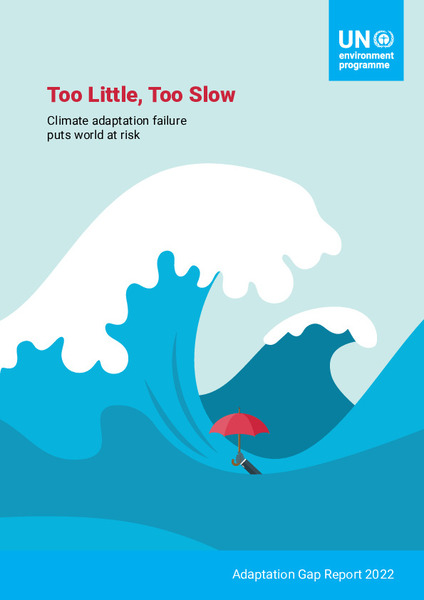| dc.contributor | Science Division | en_US |
| dc.contributor.author | United Nations Environment Programme | en_US |
| dc.contributor.other | United Nations Environment Programme Copenhagen Climate Centre | en_US |
| dc.contributor.other | World Adaptation Science Programme | en_US |
| dc.contributor.other | Neufeldt, Henry | en_US |
| dc.contributor.other | Christiansen, Lars | en_US |
| dc.contributor.other | Dale, Thomas | en_US |
| dc.contributor.other | Magnan, Alexandre | en_US |
| dc.contributor.other | del Pilar Bueno Rubial, María | en_US |
| dc.contributor.other | Tawfig, Fatin | en_US |
| dc.contributor.other | Maletjane, Motsomi | en_US |
| dc.contributor.other | Nachmany, Michal | en_US |
| dc.contributor.other | Navi, Maryam | en_US |
| dc.contributor.other | Davies, Marcus | en_US |
| dc.contributor.other | Waite, Danny | en_US |
| dc.contributor.other | Watkiss, Paul | en_US |
| dc.contributor.other | Chapagain, Dipesh | en_US |
| dc.contributor.other | Pauw, Pieter | en_US |
| dc.contributor.other | Savvidou, Georgia | en_US |
| dc.contributor.other | Butera, Blanche | en_US |
| dc.contributor.other | Dibley, Arjuna | en_US |
| dc.contributor.other | Leiter, Timo | en_US |
| dc.contributor.other | Ley, Debora | en_US |
| dc.contributor.other | König, Michael | en_US |
| dc.contributor.other | Segnon, Alcade C. | en_US |
| dc.contributor.other | Singh, Chandni | en_US |
| dc.contributor.other | Brooks, Nick | en_US |
| dc.contributor.other | Berrang-Ford, Lea | en_US |
| dc.contributor.other | Biesbroek, Robbert | en_US |
| dc.contributor.other | Totin, Edmond | en_US |
| dc.contributor.other | Thomas, Adelle | en_US |
| dc.coverage.spatial | Global | en_US |
| dc.date.accessioned | 2022-10-31T19:51:41Z | |
| dc.date.available | 2022-10-31T19:51:41Z | |
| dc.date.issued | 2022-11 | |
| dc.identifier.isbn | 978-92-807-3982-4 | |
| dc.identifier.other | DEW/2480/NA | |
| dc.identifier.uri | https://wedocs.unep.org/20.500.11822/41078 | |
| dc.description | Climate change is landing blow after blow upon humanity, The international community must urgently reduce greenhouse gas emissions through a transformation of energy, industry, transport, food systems, financial systems and so much more. However, as the 2022 edition of UNEP’s Adaptation Gap Report: Too Little, Too Slow finds, we must also urgently increase efforts to adapt to the impacts of climate change that are already here and to those that are to come. The report finds that global efforts in adaptation planning, financing and implementation are increasing incrementally. However, they are not keeping pace with increasing climate
risks. | en_US |
| dc.format | Text | en_US |
| dc.language | English | en_US |
| dc.rights | Public | en_US |
| dc.subject | climate change adaptation | en_US |
| dc.subject | climate policy | en_US |
| dc.subject | environmental financing | en_US |
| dc.subject | climate change mitigation | en_US |
| dc.subject | financing | en_US |
| dc.subject | risk reduction | en_US |
| dc.subject | developing country | en_US |
| dc.title | Adaptation Gap Report 2022: Too Little, Too Slow - Climate Adaptation Failure Puts World at Risk | en_US |
| dc.type | Reports, Books and Booklets | |
| dc.type | Publications | |
| dc.type | Reports, Books and Booklets | en_US |
| dc.type | Publications | en_US |
| dcterms.hasPart | Executive Summary - https://wedocs.unep.org/20.500.11822/41079 | |
| wd.identifier.sdg | SDG 13 - Climate Action | en_US |
| wd.topics | Climate Action | en_US |
| wd.topics | Finance and Economic Transformations | en_US |
| wd.identifier.pagesnumber | 84 p. | en_US |


